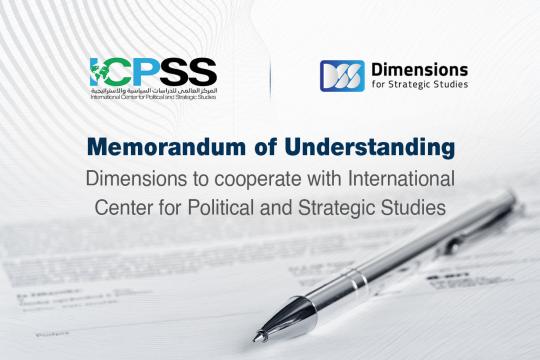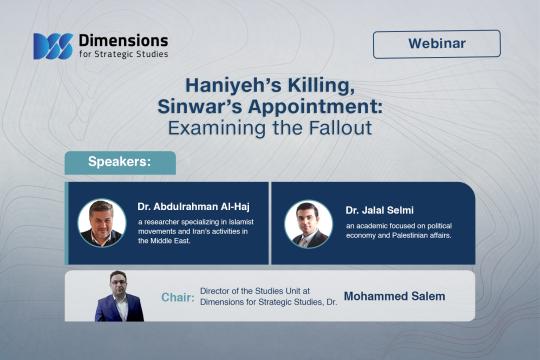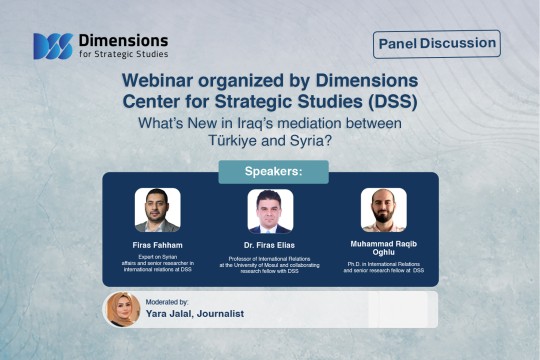
Decoding the Recent U.S.-Iran Deal: Repercussions and the Road Back to the Nuclear Accord
2023-08-224092 view
Dimensions for Strategic Studies (DSS) held a Twitter panel discussion, Monday, September 18,2023 hosting Dr. Khattar Abu Diab, who discussed the implications of the recent U.S.-Iran hostage deal.
Dr. Khattar Abu Diab, a lecturer in International Political Relations at the University of Paris, spoke about the tensions between the two sides in Syria and the broader region, and how they might affect the long-stalled Iranian nuclear file.
The discussion, moderated by Firas Faham, a researcher at DSS, explored the deal's impact on the prospects for returning to the nuclear agreement and recent developments in the region.
Dr. Khattar Abu Diab believes it is important to question the main reason behind the United States sending its troops to the Middle East and the deal struck between the two sides, as well as its impact on the Iranian nuclear file and its implications for the electoral race in the US.
These moves come after the United States and Iran reached an agreement for a prisoner exchange and the release of funds, coinciding with tensions between Russia and Iran on one side, and the United States on the other, in Syria and the Middle East at large.
Abu Diab pointed out that this comes amid a U.S. mobilization in Syria, amid threats from Iranian militias to expel American forces. He also noted that there is American talk about the need to cut off the "Tehran-Baghdad-Damascus-Beirut" route, the possibility of a preliminary arrangement for some action or a larger agreement, or an attempt to attract attention between the two sides. Additionally, Abu Diab mentioned the American conditions for releasing Iran's frozen assets.
Moreover, Abu Diab added that there is insistence on the part of the United States for the frozen funds, valued at 10 billion dollars, to be spent through Qatari mediation on medicine, medical supplies, humanitarian needs, and food. However, the Iranian side wants to have complete freedom in how it utilizes its funds.
The lecturer in International Political Relations touched on the "cash" deal during the tenure of former President Barack Obama, which called for the release of $100 billion in Iranian assets, noting that this was enough to finance Iran's proxies in the region with all kinds of power.
Abu Diab explained that during President Obama's administration, messages were sent to Saudi Arabia indicating that it was a pariah state. However, he noted that things have changed; an American website revealed an anticipated meeting between Joe Biden and Mohammed bin Salman (MBS) on the sidelines of the G20 Summit in India.
Also, Abu Diab believes that the current relationship between the United States and Iran is based on freeing hostages; all of this occurs before the U.S. elections, with Joe Biden aiming to improve his electoral standing through this deal.
Regarding the stalling on the Iranian nuclear file, Abu Diab sees that Iran's support for Russia in the Ukraine war and the revelation that the U.S. special envoy to Iran was accused of passing military secrets to the Iranian government are all interconnected issues between the two sides.
He added that the United States does not want to sever ties with Iran, nor does it want the Iranian card to go to China or Russia. It is implicitly indicating that it is preventing Israel from launching a military strike against Iran.
Abu Diab mentioned that the shift made by the Obama administration in 2015—towards the Pacific and withdrawal from the Middle East—has been abandoned. The United States wants to freeze the Iran file through a partial agreement before the American elections and tries to prevent Iran from fully aligning with the other axis.
He clarified that the United States aims to prevent an Iranian-Saudi agreement under Chinese sponsorship. Therefore, it raises the issue of Saudi-Israeli relations, albeit intermittently, to prevent significant Iranian-Saudi rapprochement.
Abu Diab pointed out that the United States is still holding its cards and trying to distribute them. It is operating on all fronts and does not want to close the line with Iran despite the poor relationship between Biden and Netanyahu.
He also said the United States wants to reassure Israel and expressed its desire not to lose Saudi Arabia and Turkey as allies, even if there is some distance with one ally or another.
Abu Diab concluded his talk by saying, "The U.S.-Iranian deal should not be exaggerated and must be put in its context. There is still a crisis of trust between the two sides, and there are reports indicating that the funds will not be transferred to the Iranian side before one month."





